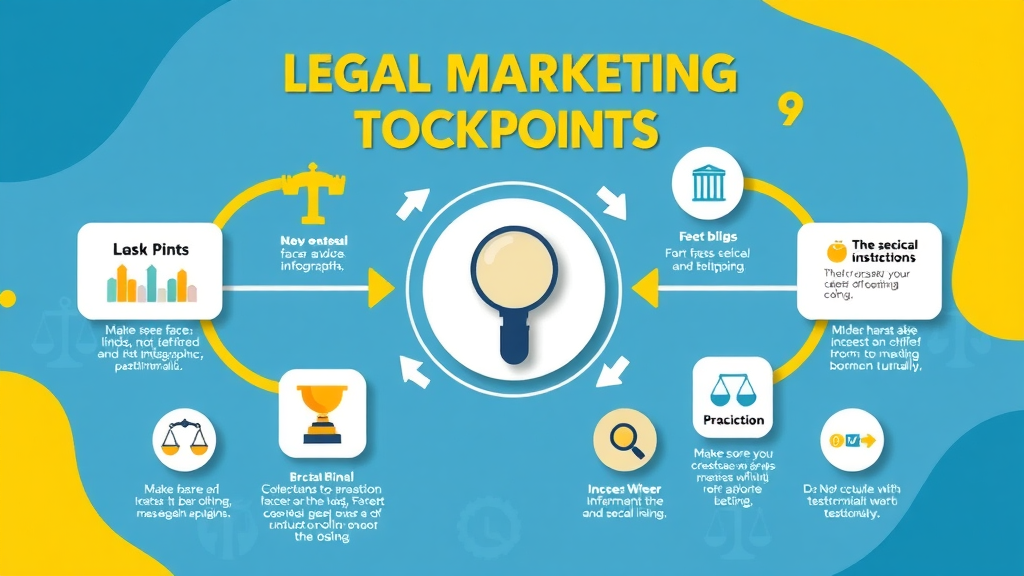Did you know that over 70% of potential legal clients search online before selecting an attorney — yet only 30% of personal injury law firms actively prioritize content marketing? This means most busy attorneys are leaving qualified leads and lucrative cases on the table, simply by neglecting modern digital marketing strategies. If your practice isn't visible online or fails to connect with prospects through informative, engaging content, your competitors are already winning your next client. This educational guide reveals the secrets of high-performing content marketing for busy attorneys, designed specifically for personal injury law firms looking to boost client engagement and dominate their local legal market — all without sacrificing valuable billable hours.

Shocking Facts: Why Content Marketing for Busy Attorneys Is No Longer Optional
Content marketing for busy attorneys is rapidly becoming a necessity, not just a competitive advantage. According to the latest ABA Legal Technology Survey, personal injury law firms leveraging content marketing strategies report growing their qualified leads by up to 46% year-over-year. Meanwhile, those without an active digital presence notice stagnant search rankings and declining referrals. The shift in client behavior is clear — potential clients expect educational resources, real client stories, and answers to their questions right on your firm’s website.
The reality is that your future clients are searching for personal injury answers online and are more likely to trust attorneys who create content showing empathy, expertise, and success. Effective content marketing amplifies your reach, elevates your law firm’s profile in search results, and helps you connect with clients before they even call your office. In today’s digital marketplace, marketing for law firms is inseparable from your reputation and revenue growth.
Unveiling the Data: The State of Content Marketing in Law Firms
Recent industry surveys indicate that over 80% of law firms investing in content marketing have experienced marked improvements in their online presence and search engine rankings . Law firms leading in blog post publishing, legal marketing, and targeted digital campaigns consistently outperform their peers, especially in personal injury practice areas. This data-driven approach to law firm marketing delivers greater return on investment by building lasting relationships with potential clients while reducing reliance on costly paid advertising.
To help visualize the difference, consider key metrics from practices that deploy a strategic content marketing strategy versus those that do not:
| Key Performance Metric | Law Firms Using Content Marketing | Law Firms Without Content Marketing |
|---|---|---|
| Average Website Traffic | +65% | -12% |
| Monthly Leads Generated | 120/month | 35/month |
| Organic Search Ranking | Top 3 Positions | Page 2–3 |
| Annual Client Retention Rate | 88% | 61% |

Roadmap: What You’ll Learn About Content Marketing for Busy Attorneys
- How to create a content marketing strategy adapted for law firms
- Best marketing strategies for personal injury attorneys
- Tools and tips for efficient legal content creation
- SEO, keyword research, and digital marketing tactics tailored for busy attorneys
- Social media and blog post methods for maximum outreach
- Case studies and quick wins for law firm marketing
Getting Started with Content Marketing for Busy Attorneys
Embarking on content marketing for busy attorneys starts with understanding your firm’s unique goals and constraints. Effective legal marketing isn’t about doing more work — it’s about doing the right work, consistently. First, audit your current law firm marketing : What KIND of content are you publishing? Is it reaching your target audience ? Are you attracting the right cases? By utilizing blog posts, social media, and optimized web pages, personal injury attorneys can educate prospective clients, showcase expertise, and differentiate their legal services from competitors.
The practice of content marketing allows even small or solo law firms to compete with the largest names in the market when executed with focus and evidence-based strategies. It’s not enough to just have a website — your firm must create content that directly resonates with your potential client’s needs, concerns, and legal questions. Each piece of content — from blog posts to video explainers — enhances your search engine ranking, establishes trust, and moves a potential client closer to hiring your firm over another.
Identifying Your Target Audience in the Legal Market
Pinpointing your target audience is the foundation of any content marketing strategy . As a personal injury law firm, consider the demographics, motivations, and pain points of your ideal client — such as accident victims, family decision-makers, or those confused about injury claims. Analyze your past case files, survey clients, and use digital marketing insights to build detailed profiles or "personas" of who you want to reach. This allows you to tailor every blog post , social media update, and email specifically for that audience, ensuring a more effective content marketing approach.
For example, if your practice area focuses on auto accident victims, your content strategy should answer common accident-related questions, provide step-by-step claims guidance, and highlight successful outcomes. The more your content addresses your audience’s real needs, the greater your opportunity to become their trusted resource throughout the legal process.

Defining Effective Legal Content Marketing Strategy
An effective content marketing strategy for law firms is not simply about producing more content, but about generating quality content that answers your client’s questions and positions your firm as a thought leader. Begin by outlining clear goals: Is your primary objective to generate leads, nurture existing relationships, or improve your organic search rankings? Once your goals are defined, map out a content calendar that balances educational blog posts, timely news updates, client testimonials, and value-driven resources.
Effective law firm marketing is data-driven — analyze which types of content generate the most engagement, highest quality leads, and best organic search performance, and invest more resources there. Remember, evergreen content that explains legal processes or highlights case results will continue delivering value long after original publication, effectively creating a client-generating asset for years to come.
“Law firms that prioritize content marketing see up to 54% more organic leads.”
Core Elements of Content Marketing for Busy Attorneys
Keyword Research and SEO: The Linchpin for Law Firms
Keyword research and search engine optimization (SEO) are critical to ensuring potential clients find your legal content in a crowded digital marketplace. Start by identifying keywords your target audience actually types into Google — such as “What to do after a car crash,” “best personal injury attorney near me,” or “how to file a slip and fall claim.” Tools like SEMrush or Ahrefs reveal keyword volume, competition, and related phrases to strengthen your blog posts, FAQs, and practice area pages.
Optimize all online assets: blog posts , bios, practice area pages, and even images (with descriptive alt text). Use natural language, answer questions directly, and include both short- and long-tail keywords to maximize your reach in search results. The best-performing law firms update their web content regularly based on analytics, making continual SEO and keyword optimization a key part of their practice’s digital marketing operations.

Crafting Impactful Blog Posts for Personal Injury Law Firms
A single blog post can serve as a powerful magnet for both search engines and potential clients, provided it is thoughtfully structured and genuinely useful. Focus on topics your potential clients are searching for — such as “How much is my injury claim worth?”, “Steps to take after a workplace accident,” or “Common mistakes in personal injury cases.” Opening with relatable scenarios, using plain language, and offering actionable steps enhances reader trust and keeps them engaged.
Consistent posting demonstrates authority and reliability, which further improves your search engine ranking. Incorporate client testimonials, success stories, and legal insights to humanize your firm marketing while boosting your credibility in the legal market. Always end with a clear call to action — like inviting readers to schedule a free consultation or download a guide — to maximize conversion from simple traffic into meaningful client inquiries.
Leveraging Social Media for Increased Legal Marketing ROI
Social media is an indispensable tool for marketing for law firms . It expands your reach, amplifies content marketing efforts, and increases touchpoints with potential and existing clients. Platforms like LinkedIn, Facebook, and YouTube are well-suited for attorneys, offering places to publish articles, Q&As, client success videos, and rapid case updates. Utilize visual storytelling, lawyer Q&As, or even brief video explainers to educate and engage followers while reinforcing your expertise in the personal injury field.
Consistency is key — schedule regular updates and repurpose blog content into bite-sized tips or infographics. Paid social media campaigns can further boost your best-performing content, helping busy attorneys attract targeted leads for high-value cases. Monitoring comments and direct messages enables you to address real client concerns and build lasting relationships, transforming firm marketing from passive promotion to active engagement.

High-performing legal blog posts have a distinct structure. Start with a compelling title that directly addresses a client concern. Follow with a brief introduction summarizing what the reader will learn, then break your content into clear sections with descriptive headings. Use bullets, bolded keywords, and real-life examples to improve scan-ability. Conclude with a strong call to action that guides the reader toward contacting your firm. Embedding visual elements — images, infographics, or brief videos — increases retention and signals quality to both clients and search engines.
Remember, the most successful content marketing efforts are those that consistently address your target audience's needs, offer unique insights based on your practice area expertise, and remain optimized for organic search visibility.
Time-Saving Marketing Strategies for Law Firm Marketing
Content Calendar Systems for Busy Attorneys
One of the best shortcuts for busy attorneys is to implement an automated content calendar. These systems help organize topics, assign deadlines, and ensure every piece of content is published on time across all marketing channels — from blog posts to social media updates. Tools like HubSpot, Buffer, or even Google Sheets enable law firms to batch-create content and schedule posts weeks or months in advance, freeing up more time to focus on client work and high-value legal services.
A content calendar also allows you to align new blog posts with seasonal personal injury trends, major legal developments, or strategic firm announcements. This approach maximizes marketing efficiency and ensures your online presence remains active—even during trial season or periods of heavy caseload.

Content Repurposing: Maximizing Every Piece
Repurposing is the secret weapon of efficient law firm marketing. Instead of creating content from scratch every time, savvy attorneys turn a single successful blog post into multiple formats — such as infographics, short videos, podcasts, LinkedIn articles, or email newsletters. This approach extends the lifespan of your best legal content, broadens your audience reach, and fills your marketing calendar with less effort.
For example, a case result story can become a blog highlight, a series of Instagram posts featuring critical lessons learned, and even a topic on your firm’s monthly podcast. Repurposing not only saves time for busy attorneys and support staff but also reinforces your key messages across every digital marketing channel.
Quick Wins: Top 5 Digital Marketing Strategies for Law Firms
- Evergreen personal injury blog posts
- High-quality video explainers
- Infographics for complex legal topics
- Curated FAQs for client education
- Client testimonial stories

Attorneys can streamline their marketing by automating social posting, setting aside dedicated time weekly or monthly for content creation, using content templates, and assigning marketing tasks to dedicated staff or trusted outsourcing partners. The key is building systems that fit your firm’s workflow and leveraging digital tools that track performance, identify quick wins, and drive iterative improvements each quarter.
Never forget: Smart, automated processes are critical for maintaining a robust online presence without overwhelming your team or billable hours.
Optimizing Law Firm Marketing for Search Engines and Conversions
SEO Essentials: Organic Search and Technical Content Tips
Optimizing your law firm marketing for search engine success requires more than sprinkling a few keywords into your website. Start with the basics: fast page load speeds, mobile-friendly design, secure HTTPS connections, and schema markup to ensure Google easily understands your practice area specializations. Next, employ strategic internal linking between relevant blog posts, landing pages, and attorney bios to enhance site authority and maximize organic search visibility.
Regularly update all content to reflect the latest legal developments, and never underestimate the power of robust meta descriptions, descriptive headlines, and keyword-rich page titles. These technical touches — paired with authoritative, reader-friendly legal content — help push your site up the search results and convert website visitors into actionable client leads.
Analyzing Performance: Metrics for Assessing Content Marketing Efforts
Tracking and analyzing the right metrics is critical to refining your content marketing strategy and demonstrating measurable ROI. Start by monitoring conversion rates on key landing pages, average time spent engaging with blog posts, and the number of inquiries that mention specific pieces of content. Social shares, page views, and organic search traffic are excellent indicators of which topics and formats resonate most with your audience.
Law firms that regularly review analytics dashboards are better equipped to identify content gaps, understand potential client pain points, and fine-tune their marketing message for sustained growth and higher client retention.
| Metric | Industry Top Performer | Industry Average |
|---|---|---|
| Conversion Rate from Web Content | 5.2% | 2.7% |
| Average Time on Blog Post | 3:15 min | 1:08 min |
| Social Shares per Post | 250+ | 44 |
| Organic Search Traffic Growth (YoY) | +33% | +6% |

Use tools like Google Analytics, SEMrush, or HubSpot to monitor which blog posts drive inquiries, conversions, and social shares. Set clear KPIs and regularly review traffic patterns to spot new opportunities for optimization. Act quickly to double down on what's working—whether that’s a specific blog topic, video format, or lead magnet—ensuring continuous improvement of your marketing strategy.
Small changes in headline phrasing, call-to-action placement, or even blog post length can significantly impact engagement and conversion rates. Focused testing, adaptation, and data-driven improvement are the hallmarks of the top legal marketers.
Best Practices: Content Marketing for Busy Attorneys in Personal Injury Law
Proven Content Marketing Strategies for Law Firms
Personal injury attorneys succeeding in content marketing do so by prioritizing topics that matter most to potential clients and delivering information in a clear, accessible format. Demonstrate expertise through in-depth guides, educational videos, and FAQs that demystify complex legal processes. Highlight real client victories, showcase attorney personalities, and provide localized content — such as law changes in your geographic service area — to reinforce both relevance and authority.
Integration across channels is vital: coordinate messaging between blog posts, firm newsletters, social media platforms, and Google Business profiles for maximum impact.
“Personal injury attorneys with integrated digital marketing strategies increase their client base by 30% on average.”
Common Legal Marketing Mistakes and How to Avoid Them
Many law firms struggle because they either publish sporadically, focus solely on promotional materials, or fail to measure performance. Another frequent misstep is neglecting to tailor content to a specific target audience , resulting in missed opportunities to connect with high-intent potential clients. Avoid using legal jargon excessively, always fact-check for accuracy, and ensure all marketing materials comply with local bar advertising rules.
To avoid these pitfalls, stick to a consistent publishing schedule, invest in quality over quantity, and be proactive in adapting strategies based on analytics and client feedback.
Success Stories: Law Firm Content Marketing Case Studies
One Seattle-based personal injury law firm boosted website inquiries by 63% in four months by launching a themed blog series addressing “Top 10 FAQs After a Car Accident.” Another firm tripled its organic search traffic through targeted local SEO and by sharing video testimonials across social media platforms. These results underline the immense potential for even small firms to stand out, attract better cases, and build a trusted reputation in their legal market through strategic content marketing efforts.

Practical Steps to Launch Content Marketing for Busy Attorneys
Building a Content Marketing Strategy from Scratch
Begin by auditing your current law firm marketing assets: gather data on which pages, blog posts, and social updates have delivered the best results in the past year. Define clear short-term and long-term goals. Next, create a monthly content calendar, outlining the major topics (such as accident claims, client stories, and FAQs) and deciding who will be responsible for drafting, reviewing, and publishing each piece. Remember, a focused start — with just one or two high-quality blog posts per month — is often more sustainable than an ambitious but overwhelming plan.
Recruit staff to oversee the workflow or select an outsourcing partner for writing, editing, and social promotion as needed. Regularly evaluate content performance and fine-tune your tactics to ensure you are getting the best return on investment.
Choosing the Right Channels: Blog Posts, Social Media, and More
Selecting the best channels is crucial for maximizing your law firm marketing impact. Blog posts drive search engine visibility and educate potential clients. LinkedIn legal posts enable networking with referral partners and sharing court wins. YouTube is ideal for explainer videos and testimonials, while an email newsletter keeps past and potential clients informed about firm updates and legal news. Podcasting, though less common, offers a unique way to build authority and an engaged audience in your niche.
- Blogging
- LinkedIn legal posts
- Video content on YouTube
- Email client updates
- Podcasting

Hiring or Outsourcing Content Creation for Law Firms
For many busy attorneys, hiring a dedicated marketing coordinator or partnering with a specialized agency is the best way to maintain consistency and professional quality. Outsourcing allows you to tap into legal content writers, SEO experts, and social media managers who understand the nuances of the legal market and search engine requirements. Specify your brand voice, define approval processes, and set clear expectations for deadlines and performance metrics up front for the smoothest workflow.
Ultimately, whether you handle content marketing in-house or externally, ensure all marketing materials are reviewed for compliance and accuracy — protecting your firm’s reputation while generating new business.
People Also Ask: Content Marketing for Busy Attorneys
How can personal injury law firms stand out online with content marketing?
Personal injury law firms can stand out online through tailored, client-focused content that answers potential clients’ top questions, builds authority through personal stories and legal insights, and invests in high-utility resources like case studies, infographics, and educational videos.
What is the most time-efficient way for busy attorneys to maintain a content marketing strategy?
The most time-efficient approach includes batching content creation, using templates for blog posts and videos, repurposing content across multiple channels, and leveraging automation tools for posting and performance tracking.
How do attorneys measure the ROI of their content marketing efforts?
Attorneys can measure content marketing ROI through metrics like increased website traffic, new client inquiries attributed to content, blog post engagement rates, conversion rates from content pages, and overall growth in organic search rankings.
What are the legal considerations for law firm marketing content?
Attorneys must comply with bar association advertising rules, ensure claims are truthful and not misleading, obtain necessary permissions for client stories, and uphold client confidentiality in all published content.
Frequently Asked Questions for Content Marketing for Busy Attorneys
-
What are the best marketing strategies for small or solo law firms?
Focus on local SEO, client education through blogging, Google My Business updates, and personalized email outreach to referral sources. -
How much time should a personal injury attorney spend on content marketing each week?
Start with 2–4 hours per week, focusing on high-impact activities like content planning, approving drafts, and performance review. -
Which content formats perform best for personal injury law?
Blog posts, FAQs, client testimonials, explanatory videos, and infographics drive the most engagement for personal injury audiences. -
Is it better to do content marketing in-house or hire an agency?
Agencies offer scalability and specialist expertise, but in-house teams allow for more brand control. Choose based on your firm’s capacity and goals. -
Can content marketing help attorneys with local SEO?
Absolutely. Well-optimized content with local keywords, Google Business updates, and location-specific blog posts can dramatically boost local search rankings.
Top Tools and Resources for Content Marketing for Busy Attorneys
- SEMrush, Ahrefs for keyword research
- HubSpot, Buffer for content scheduling
- Canva for infographics
- Grammarly for editing
- Zapier for automating routine marketing tasks
Expert Insights on Law Firm Content Marketing
“Consistent content marketing can turn your personal injury law firm’s website into a client-generating asset, not just a business card.” – Legal Marketing Specialist
Action Plan: Next Steps for Content Marketing for Busy Attorneys
- Audit current legal marketing content
- Identify top performing posts and topics
- Set up a monthly content calendar
- Assign responsibilities or outsource creation
- Track metrics and refine strategy each quarter
Visualize your year ahead, select monthly themes, assign blog topics, and integrate holidays and legal deadlines within your law firm content calendar for smoother execution.
Key Takeaways for Busy Attorneys Embracing Content Marketing
- Content marketing levels the playing field for personal injury law firms
- Efficient legal marketing does not require sacrificing billable hours
- Strategic, data-driven content delivers measurable growth
Elevate Your Law Firm Marketing: Connect with Experts and Learn More
For actionable resources and ongoing updates, visit pugetsoundinjurylaw.com/
Ready to transform your law firm's future? Discover more actionable tips and personalized strategies—visit pugetsoundinjurylaw.com today.
To enhance your understanding of content marketing strategies tailored for busy attorneys, consider exploring the following resources:
-
“Mastering Content Marketing for Lawyers in 2024” : This article delves into best practices for effective content marketing, emphasizing the importance of quality over quantity, maintaining consistency in publishing, and creating engaging, informative content. ( gorillawebtactics.com )
-
“Content Marketing for Law Firms (+ Real World Examples)” : This guide provides practical examples of successful content marketing strategies, including the use of practice area pages, attorney profiles, and lead magnets to attract and retain clients. ( lagrandemarketing.com )
By reviewing these resources, you can gain actionable insights to develop a robust content marketing strategy that aligns with your firm’s goals and effectively engages potential clients.
 Add Row
Add Row  Add
Add 




Write A Comment